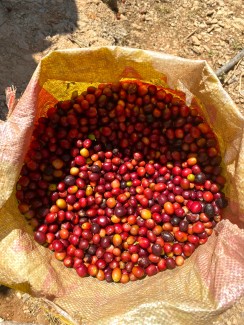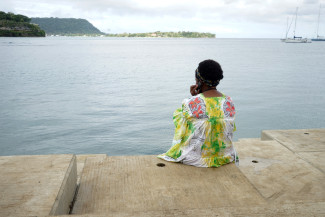From extreme storms to coastal flooding, the least developed countries (LDCs) are disproportionately affected by the impacts of climate change. More than two-thirds of climate-related disaster fatalities worldwide have occurred in these nations. This is why environmental sustainability is a cross-cutting issue that has been central to the trade capacity-building agenda of the EIF. The environment has not only been a cross-cutting priority for the EIF since the beginning of Phase Two, but it is also embedded in the EIF's strategic plan. Moreover, an indicator has been established to ensure that impact measurement considers environmental dimensions.
In order to ensure that climate change and environmental considerations are incorporated into planning as early as possible, the EIF has published a “Quick Guide” for the development of Diagnostic Trade Integration Studies (DTISs).
By addressing environmental concerns at the DTIS stage, the LDCs can seamlessly incorporate such considerations as standard planning processes. The movement toward addressing climate and environmental issues in DTISs has increasingly become common practice. For example, Zambia’s DTIS Update dedicates an entire chapter to climate and trade.
Over time, environmental and climate change considerations have been increasingly incorporated into the EIF's work. In particular, collaboration with the Overseas Development Institute (ODI) and the International Institute for Environment and Development (IIED) has helped bring policymakers together to ensure that the international climate and trade architecture better supports LDCs’ climate adaptation and mitigation efforts. This included bringing together trade and climate negotiators and developing policy-oriented research in climate finance, technology transfer, and carbon markets and standards.
Leveraging climate finance for trade
With the EIF's catalytic mandate, new opportunities are emerging to better link Aid for Trade and climate finance. Trade-related climate finance is an area that is still in its infancy in the LDCs. It is relatively common for countries to have climate-related nationally determined contributions tied to industries such as forestry or agriculture. However, The Gambia has pioneered a new approach to accessing trade-related climate finance, facilitated through the EIF in conjunction with partners such as the WTO and the World Bank.
This represents the first time that such an activity has been requested by an EIF-supported LDC and demonstrates an increased awareness of the impact of climate change in the LDCs and the nexus between climate change and trade.
This innovative approach has already attracted interest from fellow LDCs — including Rwanda, Sierra Leone, South Sudan and Tuvalu — with some having already arranged study tours to Banjul to better understand the climate finance strategy. This engagement has also already forged new relationships and fostered new networks at the ministerial level. The Gambia has now developed a multi-million-dollar proposal on Green Industrialization through Special Economic Zones and Agropoles and working with partners, such as the African Development Bank, The Gambia is in the process of submitting the proposal to the Green Climate Fund.
And leveraging digital solutions for trade and the environment
With numerous investments supporting digital trade for the LDCs, strong environmental linkages have been built. For instance, the EIF's project to support the establishment of an Electronic Single Window System in Vanuatu was a strategic initiative aimed at streamlining trade procedures, reducing trade barriers and stimulating economic growth. The initiative also stands as an important example of how environmental challenges in the LDCs can be addressed in concert with economic progress.
The project focused on enhancing the efficiency of goods movement across borders, thus increasing Vanuatu's attractiveness as a destination for international trade and investment. By allowing customs data to be submitted electronically, automating various functions, and integrating systems, Vanuatu’s ESW reduced clearance times, improved efficiency, and simplified the overall trade process.
The initiative also reduced the use of paper-based transactions by more than 95%, resulting in 42,000 fewer pages of paper being used per year to process trade-related transactions. The digitization of transactions also resulted in a reduction of greenhouse gas emissions by requiring at least 25,000 fewer vehicle-based trips by traders to government offices. As a result of the successful implementation of the project, according to the UN Economic and Social Commission for Asia and the Pacific, Vanuatu was the top ranked country in the Pacific Islands.
Promoting the circular economy, Rwanda has established an e-waste processing facility following EIF support in the development of an e-Waste policy. Run through a public-private partnership, the facility has repurposed 2,000 refurbished computers for schools, and recycled plastics and metals that can no longer be re-used. The facility imports electronic waste from neighbouring countries, and exports complex components for further processing.
Through cross-country learning, these and other catalytic green initiatives are being taken up by other LDCs. There is a need for further scaling, learning and replication through the unlocking of private and public investments in these areas.
The EIF has invested into over 100 environmentally focused actions in the LDCs. More information on these investments can be found in the EIF's latest and past Annual Reports and on the Trade for Development News platform.
This article draws on the EIF 2023 Annual Report, with thanks to written contributions from Andrew Aziz. Thanks also to EIF colleagues including, amongst others, Fanan Biem, as well as for reviews from Ratnakar Adhikari and Adeline Masson.
If you would like to reuse any material published here, please let us know by sending an email to EIF Communications: eifcommunications@wto.org.



